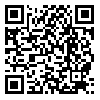Volume 3, Issue 2 (6-2013)
J Research Health 2013, 3(2): 379-387 |
Back to browse issues page
Download citation:
BibTeX | RIS | EndNote | Medlars | ProCite | Reference Manager | RefWorks
Send citation to:



BibTeX | RIS | EndNote | Medlars | ProCite | Reference Manager | RefWorks
Send citation to:
Hassanvand Amouzadeh M, Shairi M R, Asghari Moghadam M A. Social anxiety prediction pattern with regard to cognitive behavioral factors. J Research Health 2013; 3 (2) :379-387
URL: http://jrh.gmu.ac.ir/article-1-157-en.html
URL: http://jrh.gmu.ac.ir/article-1-157-en.html
1- Shahed university of Tehran , m.amouzade@gmail.com
2- Shahed university of Tehran
3- Shahed university of Tehra
2- Shahed university of Tehran
3- Shahed university of Tehra
Abstract: (17138 Views)
Social anxiety is one of the most debilitating anxiety disorders that can negatively affect all aspects of a person's life. Yet, despite the fact that its prevalence rates are relatively high, factors associated it are still poorly understood. The study aimed at determining the prediction model of social anxiety through investigating variables like: depression, shame, behavioral Inhibition, shyness,and anger aspredictors of social anxiety. The study applied a correlative method and a Sample of 581 participants (235 males and 346 females) selected through Cluster Sampling from among Shahed University students. Data were collected through Social Fobia Inventory, Revised Check and Buss Shyness Scale, The third Scale of Adult Self-Conscious Affection, Carver and White Behavioral Activation/Inhibition System Scale, Depression Anxiety Stress Scale-21 and the State-Trait Anger Expression Inventory-2. Data were then analyzed using Pearson correlation coefficient and Simultaneous Multiple Regression Analysis in SPSS-16 software. All variables were significantly correlated with social anxiety. Simultaneous multiple regression analysis suggested that with the exception of anger which cannot predict social anxiety, other studied variables (depression, shame, behavioral inhibition, and shyness) can predict social anxiety. Although part of the obtained results are in line with other research findings, the rest should be encountered carefully and more cross-cultural and inter-cultural research can help scrutinize the findings.
Type of Study: Orginal Article |
Received: 2012/08/20 | Accepted: 2013/07/8 | Published: 2013/07/8
Received: 2012/08/20 | Accepted: 2013/07/8 | Published: 2013/07/8
| Rights and permissions | |
 |
This work is licensed under a Creative Commons Attribution-NonCommercial 4.0 International License. |






